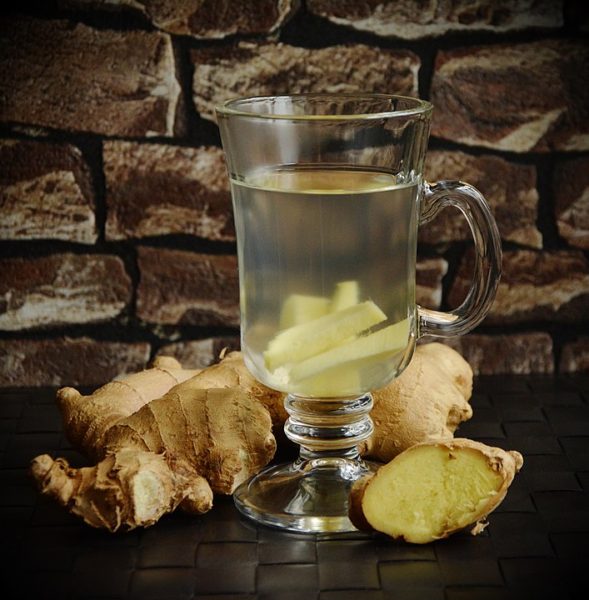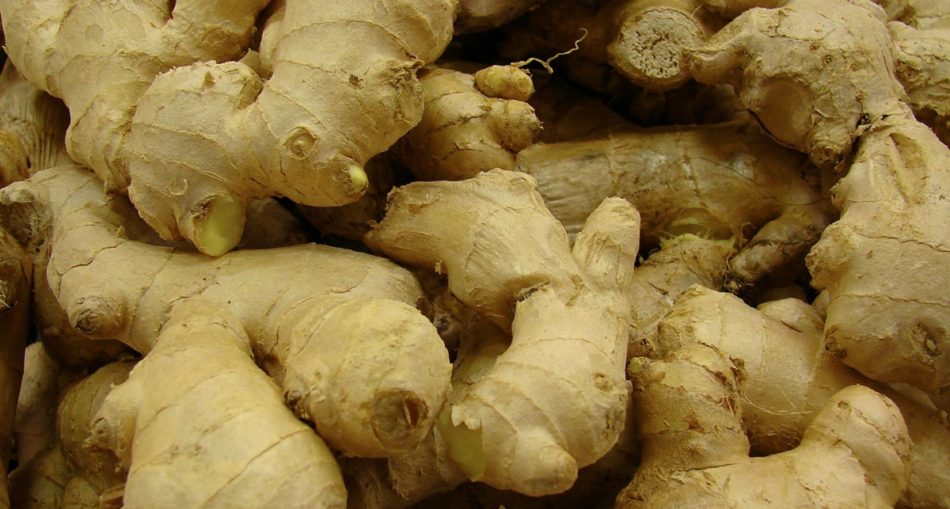Ginger (Zingiber officinale) is among the healthiest spices in the world. This spice boosts saliva production and has many different benefits of using it. Ginger is a flowering plant belonging to the Zingiberaceae family. The spice is related to turmeric, cardamom and galangal. The spice is obtained from the underground stem, known as the rhizome. Commonly referred to as ginger or ginger root, the spice has a rich and long history in traditional medicine.
Ginger can be used in many forms including fresh, dried, as a powder, juice, oil. It is also added to some processed foods and cosmetics and a local ingredient in recipes. The distinctive flavour of Ginger is produced by its natural oils, among which is gingerol.
In Guyana, Ginger is used in making ginger beer that is a beverage typically consumed during Christmas time in many Caribbean households but also enjoyed throughout the year. It is also added to various foods to give it a distinct taste and flavour.

Ginger – Photo By Forest & Kim Starr, CC BY 3.0, https://commons.wikimedia.org/w/index.php?curid=6178093
Origin Of Ginger
The species is believed to have originated in Southeast Asia, in the Himalayan foothills of Northern India. From here it was distributed to India and then to South Central China. Presently, Ginger a major spice is grown widely in tropical and subtropical Asia, Africa and the Caribbean.
Description Of Ginger
The Ginger plant (Zingiber officinale) is perennial, herbaceous and usually erect. The leaves of the Ginger plant grows about seven (7) cm in length and one point nine (1.9) cm wide. Ginger has flowers pale yellow in colour and shaped like cones. Flowering heads grow on shorter stems. The Ginger plant itself is about two to four (2–4) feet. Ginger is a rhizome, a plant stem which grows underground, the main parts of which we get the spice. This root is typically tangled, with a light tan colour while the inside is a very pale yellow
Scientific Classification of Ginger
- Kingdom: Plantae
- Clade: Tracheophytes
- Clade: Angiosperms
- Clade: Monocots
- Clade: Commelinids
- Order: Zingiberales
- Family: Zingiberaceae
- Genus: Zingiber
- Species: Z. officinale
Nutritional Value Of Ginger
Ginger is a great source of vitamins and minerals and other nutrients. An intake of 24 gram of ginger offers 0.054 mg of Copper, 4.26 g of Carbohydrate, 0.038 mg of Vitamin B6, 0.055 mg of Manganese,10 mg of Magnesium,100 mg of Potassium and 0.14 mg of Iron. Moreover many Amino acids like 0.003 g of Tryptophan, 0.009 g of Threonine, 0.012 g of Isoleucine, 0.018 g of Leucine and 0.014 g of Lysine are also found in 24 gram of Ginger.
19 Amazing Health Benefits Of Ginger
- Relieves Nausea – Ginger helps to relieve nausea, morning sickness in pregnant women, seasickness and even vomiting. It is especially useful for patients who have done chemotherapy because it reduces their nausea and vomiting. Ginger is absorbed and regulated quickly in the body and so relives nausea. This spice is known to treat migraines and headaches which tend to follow nausea and can fight off the common cold and flu. As a tea, it keeps the body warm and makes you sweat out toxins.
- Helps Digestion – Ginger helps to regulate high sugar levels, which is common after a large meal. The stomach may reduce the emptying of its content due to the amount of sugar. It also helps in nutrient and mineral absorption and thus used to stimulate appetites to prepare for the following dishes.
- Rids of Excess Gas – Zingiber officinale removes gas from the body, the accumulation of which can move upwards and cause stress on internal organs. To eliminate the gas in the body, chew on a tiny piece of ginger.
- Reduces Chances of Stomach Ulcers – The regular use of the spice can prevent ulcers, which are caused by acute gastric irritability and bleeding. It also stops the growth of a bacteria called H. pylori bacteria.
- Treats Arthritis Pain – gingerol, contained in Ginger has anti-inflammatory properties, which reduces joint pain and improves bone health. In addition, it prevents cytokines and chemokines from affecting the body.
- Relieves Asthma – Traditionally, Ginger is used to treat respiratory issues. A compound called Zerumbone helps to treat asthma. Ginger suppresses the airway inflammation that causes asthma.
- Protects The Liver – Ginger prevent hepatotoxicity in tuberculosis and prevents liver poisoning. It also protects against the liver-damaging cadmium poisoning caused due to significant ingestion of cadmium.
- Prevents Obesity – Consuming Ginger helps to increase your endurance and boosts your metabolism so you are able to work out and get fit.
- Prevents Cancer – Gingerol prevents several types of cancer including skin and breast cancer. Anti-inflammatory properties reduce carcinogenic activity which can cause colon cancer. Gingerol is also proven to reduce tumours and the growth of cancer cells. Zerumbone, prevents gastric, ovarian, and pancreatic cancer because it is an anti-angiogenic and antitumor drug.
- Improves Memory – Ginger reduces inflammation oxidative stress which postpones neurodegenerative diseases such as Parkinson’s Disease and Alzheimer’s. It reduces the chances of brain damage and sustains memory.
- Relieves Muscle Soreness – After exercising, Ginger helps to reduce soreness and muscle pain.
- Prevents Menstrual Cramps – This spicy root reduces the amount to prostaglandin, which causes things like menstrual cramps, and pains and fever.s
- Improves Heart Health – Ginger lowers the LDL cholesterol (bad cholesterol) levels while increasing HDL cholesterol (good cholesterol) levels. It keeps your heart healthy and reduces blood clotting, which in turn regulates hypertension.
- Controls Blood Sugar Levels – Ginger helps to improve insulin resistance and control Type 2 Diabetes in persons.
- Great Detoxifier – Ginger induces sweating, cleaning pores and thus getting rid of toxins. Dermcidin found in perspiration, creates a protective layer and reduces bacterial and viral infections.
- Prevents Infection – Ginger maintains good oral health by destroying pathogens in the mouth, keeping the teeth and gums intact. antibacterial properties prevent the occurrence of pathogenic bacteria known to cause bronchitis, UTIs and pneumonia. Not only this but stops the growth of numerous infections including bacterial, fungal and viral.
- Treats Diarrhoea – Stomach spasms and can which, contribute to diarrhoea can be prevented with the use of ginger.
- Improves Skin – Because of inflammatory properties ginger can help in the treatment of eczema, acne, dermatitis and psoriasis.
- Increases Sexual Activity – Ginger is an aphrodisiac, which improves sexual activity and stimulates blood flow in the lower abdomen.
Uses Of Ginger Worldwide
- In Asian cuisines, fresh and raw ginger is one of the main ingredients used in soups, rice, noodle, and stews.
- To make the taste of sushi more pleasing, pickled ginger is often served with it.
- Ginger is used in the flavouring of a wide range of beverages around the world like tea, coffees, soda, and even cocktails.
- This spice also flavours many of your holiday favourites like ginger cookies, candy, and the gingerbread man.
- Ginger Tea is simple to make and a great remedy for coughs and cold.
- The juice treats nausea and digestive problems.
- Soaps, shampoos, massage oils, and perfumes contain ginger extracts.
Ginger Supplements include:
- Dried ginger
- Capsules
- Extracts
- Syrups
- Powder form
- Essential oils
Common Side Effects Of Ginger
- Breathing issues
- Diarrhoea
- Heartburn
- Hives
- Stomach upset
- Swelling
Risks of Ginger
- Acid-reflux – In some persons, this root may make acid reflux worse.
- Blood-thinning – Ginger should not be used with medicines like aspirin which thins blood because it can affect blood clots.
- Diabetes – Talk to your doctor before using Giner because it can affect blood sugar and insulin levels in the body.
- Gallstones – Increased bile production due to Ginger may form a stone that blocks the flow of bile.
- Pregnant women – Ginger is generally safe but can induce miscarriages.
Interesting Fact
- Queen Elizabeth I of England, invented the gingerbread man and was a big fan of Ginger.

Photo By congerdesign – https://pixabay.com/photo-1714106/ archive copy, CC0, https://commons.wikimedia.org/w/index.php?curid=67129519
Here is how to make Ginger Tea
Ingredients
- 1 cup water
- 1/2 tbsp, ginger grated
- 1/2 tsp lime juice
- brown sugar
Method
- In a small pot, heat water and allow to boil.
- Strain tea.
- Add sugar and lime juice.
- Enjoy!
Ginger
Ginger is one of the healthiest spices in the world, packed with numerous beneficial nutrients for our bodies and brain. Ginger is typically added to foods and beverages for a more distinct taste and robust flavour.
Article References:
- https://www.organicfacts.net/health-benefits/herbs-and-spices/ginger.html
- https://www.healthline.com/nutrition/11-proven-benefits-of-ginger#section12
- https://www.healthbenefitstimes.com/ginger/
- https://en.wikipedia.org/wiki/Ginger
- https://plantvillage.psu.edu/topics/ginger/infos
Last Updated: 2020-07-23








1 Comment